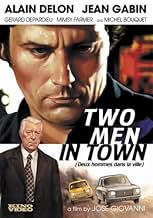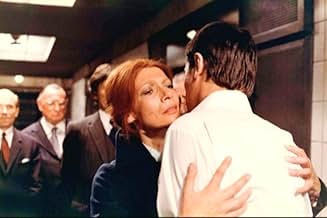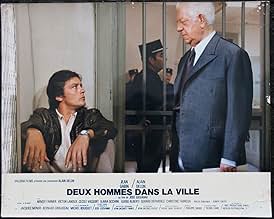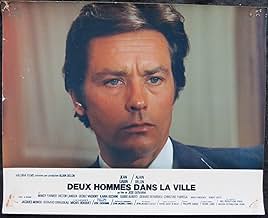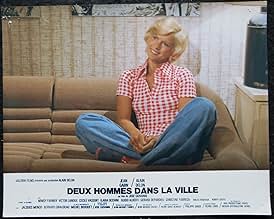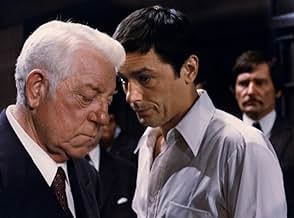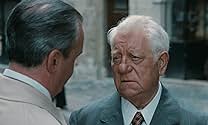IMDb रेटिंग
7.3/10
5.7 हज़ार
आपकी रेटिंग
अपनी भाषा में प्लॉट जोड़ेंA former bank robber is released after 10 years in prison. He gets help from a social-worker, but gets harassed by an old cop from his past.A former bank robber is released after 10 years in prison. He gets help from a social-worker, but gets harassed by an old cop from his past.A former bank robber is released after 10 years in prison. He gets help from a social-worker, but gets harassed by an old cop from his past.
Malka Ribowska
- L'avocate de Gino
- (as Malka Ribovska)
फ़ीचर्ड समीक्षाएं
I never cried watching Alain Delon's film before, but this one is an exception.
However, despite the differences between Alain Delon and Jean Gabin, their acting styles share melancholy and barely repressed violence. In Two Men in Town (1973), the final of their collaborations together, the stars share enough iconic chemistry for their scenes to reflect the intergenerational passing of a torch.
This is such a touching film. It's so sad when I see the ratings and review while this film should be more have recognition.
Good job, Alain! Also my crush.
However, despite the differences between Alain Delon and Jean Gabin, their acting styles share melancholy and barely repressed violence. In Two Men in Town (1973), the final of their collaborations together, the stars share enough iconic chemistry for their scenes to reflect the intergenerational passing of a torch.
This is such a touching film. It's so sad when I see the ratings and review while this film should be more have recognition.
Good job, Alain! Also my crush.
Exceptionally realistic and brooding film in which Jean Gabin as an honorable social worker is awesome , as well as Delon playing a paroled delinquent . It is an above average flick with thoughtful events and top-drawer perforances. So Alain Delon as a cold and two-fisted ex-delinquent is top notch and Jean Gavin as a serious and clever social worker is magnificent . It deals with Gino (Alain Delon) , a previous bank robber who's released after 10 years in prison thanks to advises from a social worker called Germain Cazeneuve (Jean Gabin) . Gino's determined to go straight, gets a steady job and returns with his wife Sophie Strabliggi (Ilaria Occhini). Unaware that it is only a matter of time before he's forced to confront destiny. As soon as a stubborn , rude police inspector Goitreau (Michel Bouquet) from his past to be aware his freedom , he goes after him . Meantime, his old partners-in-crime (Victor Lanoux, Gerard Depardieu..) also begging him to pick up where they left off long time ago . Along the way , Gino is relentlessly pursued and harassed by the obstinate inspector and eventually Gino seeks vengeance .
Classic French Polar film with two greatest stars of the seventies dealing with an account of the influence and support of a social worker on a paroled ex-inmate . This is a suspense ¨Polar¨ or French Noir film in which tesion , drama , intrigue and thriller are continuous . From the beginning to the end it turns out to be interestibg , dramatic and suspenseful , including well developing of interesting characters , and that's why it is entertaining . The movie has great loads of emotion , dark-edged drama , tension and intriguing events . Exciting and thought-provoking screenplay by director Jose Giovanni himself , in fact he film was part of a campaign against death penalty (by means of guillotine , the ordinary tool used for carrying out the execution) in France that took place in the 1970's that was eventually abolished in France in 1981. Concerning a character studio about unsettling roles damned to inevitable tragedies , a powerful finale , as well as stylized set pieces heightens the suspense and tension having place in all Jose Giovanni's film-making . One of his favourite actors was Alain Delon , whom Jose directed many times . Actors' interpretation is excellent as Jean Gavin playing a warm and compassionate social worker . And Alain Delon as a serious as well as tough ex-delinquent , former safe-cracker with dark past is magnificent .This is the best of Giovanni 's thrillers with Alain Delon as the expressionless delinquent . Delon's most successful film was ¨Le Samouraï ¨, Delon has striven in vain to repeat this success in numerous subsequent movies at the same genre , similar others known actors as Lino Ventura , Jean Paul Belmondo and generally directed by Henri Verneuil , Jose Giovanni and Jacques Deray . Delon went on to appear with Gabin in several of the star's subsequent movies , often playing a gangster , including the classic ¨The Clan of Sicilians" , and going on the criminal genre with Jean Gabin in "The Big Snatch" (1963) , this work, a classic example of the genre, was distinguished not only by a soundly worked-out screenplay, but also by the careful production and the awesome performances of both Delon and Gabin. It was only in the late 1960s that the sleek and lethal Delon came to epitomize the calm, psychopathic hoodlum, staring into the camera like a cat assessing a mouse. Support cast is pretty good , such as : Mimsy Farmer, Victor Lanoux, Ilaria Occhini , Bernard Giradeau , Guido Alberti , Christine Fabréga and brief apperance of a young Gérard Depardieu. Special mention for Michael Bouquet as the malevolent , stubborn Police Inspector Goitreau .
Evocative and atmospheric cinematography by Jean-Jacques Tarbès is simply riveting . Adding enjoyable musical score by Philippe Sarde, it's sensitive and agreeable , including a feeling leitmotif . The motion picture was well produced by Pierre Caro, André Mucchielli and Alain Delon himself. Being compellingly written/directed by Jose Giovanni , making a memorable work , though sometimes results to be slow-moving . Giovanni participated in the French Resistance during World War II . Worked as a lumberjack , diver , mountain guide and coal miner . Jose wrote 20 novels, 2 memories' books , 33 scripts , and directed 15 movies and 5 TV movies . His novel, "Le Trou," ("The hole", slang for prison) , which became a classic film , was based on his own escape attempt from a Paris prison . Director Jacques Becker bought the rights of the book and directed it in 1959 , considered to be the best prison movie . That's how José Giovanni entered the cinema world . He became a well-known dialoguist , scenarist too, working many times with Jacques Becker . Then he directed his first movie in 1966 , "La Loi Des Survivants" , while he was still writing novels about gangsters , cops , prison and manly friendship . He was a purveyor of a certain kind of noir movie , creating his own company and a tiny studio . Some of his films , many are based from his own novels , include Le Rapace (1968), La Scoumoune (1972) , The gypsy (1975) , Boomerang (1976) , and Le Ruffian (1983). Giovanni directed some great French actors as Alain Delon , Jean Gabin , Jean-Paul Belmondo , and , of course , Lino Ventura .
Classic French Polar film with two greatest stars of the seventies dealing with an account of the influence and support of a social worker on a paroled ex-inmate . This is a suspense ¨Polar¨ or French Noir film in which tesion , drama , intrigue and thriller are continuous . From the beginning to the end it turns out to be interestibg , dramatic and suspenseful , including well developing of interesting characters , and that's why it is entertaining . The movie has great loads of emotion , dark-edged drama , tension and intriguing events . Exciting and thought-provoking screenplay by director Jose Giovanni himself , in fact he film was part of a campaign against death penalty (by means of guillotine , the ordinary tool used for carrying out the execution) in France that took place in the 1970's that was eventually abolished in France in 1981. Concerning a character studio about unsettling roles damned to inevitable tragedies , a powerful finale , as well as stylized set pieces heightens the suspense and tension having place in all Jose Giovanni's film-making . One of his favourite actors was Alain Delon , whom Jose directed many times . Actors' interpretation is excellent as Jean Gavin playing a warm and compassionate social worker . And Alain Delon as a serious as well as tough ex-delinquent , former safe-cracker with dark past is magnificent .This is the best of Giovanni 's thrillers with Alain Delon as the expressionless delinquent . Delon's most successful film was ¨Le Samouraï ¨, Delon has striven in vain to repeat this success in numerous subsequent movies at the same genre , similar others known actors as Lino Ventura , Jean Paul Belmondo and generally directed by Henri Verneuil , Jose Giovanni and Jacques Deray . Delon went on to appear with Gabin in several of the star's subsequent movies , often playing a gangster , including the classic ¨The Clan of Sicilians" , and going on the criminal genre with Jean Gabin in "The Big Snatch" (1963) , this work, a classic example of the genre, was distinguished not only by a soundly worked-out screenplay, but also by the careful production and the awesome performances of both Delon and Gabin. It was only in the late 1960s that the sleek and lethal Delon came to epitomize the calm, psychopathic hoodlum, staring into the camera like a cat assessing a mouse. Support cast is pretty good , such as : Mimsy Farmer, Victor Lanoux, Ilaria Occhini , Bernard Giradeau , Guido Alberti , Christine Fabréga and brief apperance of a young Gérard Depardieu. Special mention for Michael Bouquet as the malevolent , stubborn Police Inspector Goitreau .
Evocative and atmospheric cinematography by Jean-Jacques Tarbès is simply riveting . Adding enjoyable musical score by Philippe Sarde, it's sensitive and agreeable , including a feeling leitmotif . The motion picture was well produced by Pierre Caro, André Mucchielli and Alain Delon himself. Being compellingly written/directed by Jose Giovanni , making a memorable work , though sometimes results to be slow-moving . Giovanni participated in the French Resistance during World War II . Worked as a lumberjack , diver , mountain guide and coal miner . Jose wrote 20 novels, 2 memories' books , 33 scripts , and directed 15 movies and 5 TV movies . His novel, "Le Trou," ("The hole", slang for prison) , which became a classic film , was based on his own escape attempt from a Paris prison . Director Jacques Becker bought the rights of the book and directed it in 1959 , considered to be the best prison movie . That's how José Giovanni entered the cinema world . He became a well-known dialoguist , scenarist too, working many times with Jacques Becker . Then he directed his first movie in 1966 , "La Loi Des Survivants" , while he was still writing novels about gangsters , cops , prison and manly friendship . He was a purveyor of a certain kind of noir movie , creating his own company and a tiny studio . Some of his films , many are based from his own novels , include Le Rapace (1968), La Scoumoune (1972) , The gypsy (1975) , Boomerang (1976) , and Le Ruffian (1983). Giovanni directed some great French actors as Alain Delon , Jean Gabin , Jean-Paul Belmondo , and , of course , Lino Ventura .
Directed and written by Corsican José Giovanni, produced by Alain Delon, who stars in the film in partnership with veteran Jean Gabin, this is certainly a different film from the French-Italian cop movies of the 60s and 70s, many of them with the same protagonists.
Here we have a regenerated ex-convict struggling to integrate into society and a police and judicial system that cannot forgive and reintegrate those who have already paid for their mistakes and truly want to turn a page in their lives.
A film that exposes the weaknesses of the French penal and judicial system while condemning the maintenance of the death penalty in modern France in 1973.
Here we have a regenerated ex-convict struggling to integrate into society and a police and judicial system that cannot forgive and reintegrate those who have already paid for their mistakes and truly want to turn a page in their lives.
A film that exposes the weaknesses of the French penal and judicial system while condemning the maintenance of the death penalty in modern France in 1973.
This is an interesting film in structure, as the main conflict doesn't even present itself until almost 40 minutes into the film. Up until then, it's a very nice story about an ex-con (Alain Delon) and his good friend--a social worker who befriended him in prison and has worked to help rehabilitate him (Jean Gabin). However, even though Delon is doing a great job on his parole (even after tragedy strikes)and is living an honest life, an old cop who arrested him a decade earlier has decided that it's his mission to PROVE that Delon didn't change and is just another con waiting to show his true colors! And so, doggedly, the cop seems determined to push Delon until he forces his to turn bad.
While the parallels are not perfect and the setting has been updated to modern France, this sure seemed like a reworking of the classic Victor Hugo story "Les Misérables". Like the leading man from the novel, Jean Valjean, Delon's character has changed after leaving prison and is committed to doing right. And, like Javert, the cop who suddenly enters his life will stop at nothing to prove that a man like Delon CAN'T change despite all appearances to the contrary. So, the cop harasses the man's employer, his girlfriend...any one and everyone. He brings Delon in for interrogations and pushes the man unmercifully--so much so that you assume sooner or later Delon will snap. What happens next is a bit of a shock--and makes for an exciting finale and a very compelling film.
It's interesting, by the way, that the bad cop is not the only thing in the system that conspires to keep criminals criminals. Other than Gabin, the rest of the prison officials in the film seem like reactionaries--who unintentionally perpetuate the problems through their stupidity. While this is somewhat of an over-simplification, I like this angle, as prison officials often do make the problems worse (I used to work with the prison system like Gabin's character and was amazed at how corrupt or dumb some of these men were--including come guards who were simply sadists). It's a novel approach (aside from the Hugo novel) and made the film quite compelling. Plus, it humanized Delon so much that you hurt for him and really were rooting for him throughout the film.
While the parallels are not perfect and the setting has been updated to modern France, this sure seemed like a reworking of the classic Victor Hugo story "Les Misérables". Like the leading man from the novel, Jean Valjean, Delon's character has changed after leaving prison and is committed to doing right. And, like Javert, the cop who suddenly enters his life will stop at nothing to prove that a man like Delon CAN'T change despite all appearances to the contrary. So, the cop harasses the man's employer, his girlfriend...any one and everyone. He brings Delon in for interrogations and pushes the man unmercifully--so much so that you assume sooner or later Delon will snap. What happens next is a bit of a shock--and makes for an exciting finale and a very compelling film.
It's interesting, by the way, that the bad cop is not the only thing in the system that conspires to keep criminals criminals. Other than Gabin, the rest of the prison officials in the film seem like reactionaries--who unintentionally perpetuate the problems through their stupidity. While this is somewhat of an over-simplification, I like this angle, as prison officials often do make the problems worse (I used to work with the prison system like Gabin's character and was amazed at how corrupt or dumb some of these men were--including come guards who were simply sadists). It's a novel approach (aside from the Hugo novel) and made the film quite compelling. Plus, it humanized Delon so much that you hurt for him and really were rooting for him throughout the film.
It represents the ash after its final credits. last meet between Gabin and Delon on screen, it is a film inspiring, for an old man like me, nostalgia. because it seems a puzzle with familiar pieces. simple. but seductive. dramatic. for the nuances. a story about second chance, justice and sins. one of films for a precise target. because it is one of keys to an universe of cinema who seems, for many reasons, lost today.
क्या आपको पता है
- ट्रिवियाThis movie was part of a campaign against death penalty in France that took place in the 1970's. Director José Giovanni was sentenced to death in 1945 right after the war and was pardoned by the then French president. Ten years later, after completing his sentence he became a writer, screenwriter and movie director. Death penalty was finally abolished in France in 1981.
- कनेक्शनFeatured in Adam & Yves (1974)
टॉप पसंद
रेटिंग देने के लिए साइन-इन करें और वैयक्तिकृत सुझावों के लिए वॉचलिस्ट करें
- How long is Two Men in Town?Alexa द्वारा संचालित
विवरण
- चलने की अवधि
- 1 घं 40 मि(100 min)
- ध्वनि मिश्रण
- पक्ष अनुपात
- 1.66 : 1
इस पेज में योगदान दें
किसी बदलाव का सुझाव दें या अनुपलब्ध कॉन्टेंट जोड़ें



